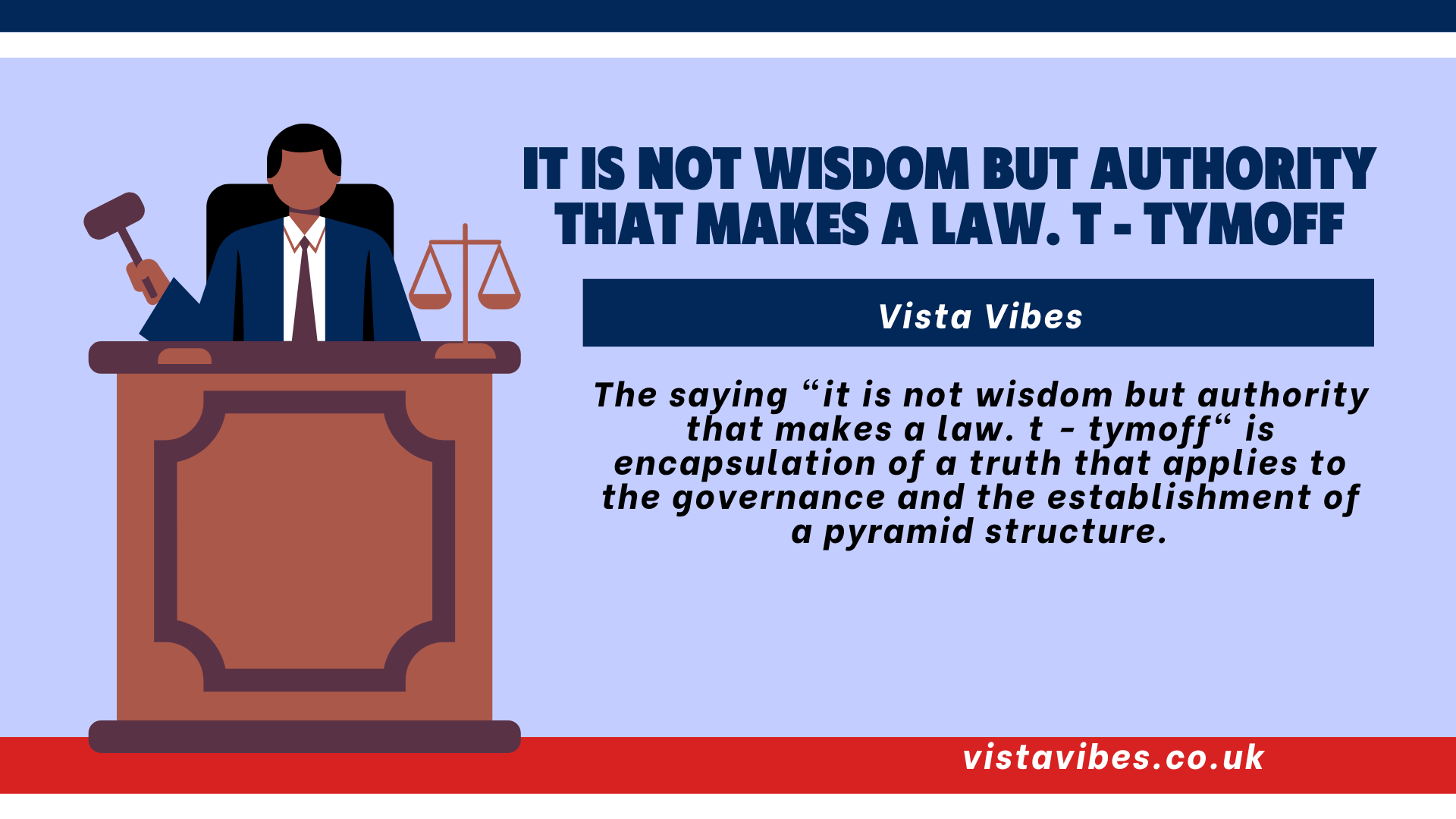In the grand tapestry of human civilization, the intertwining threads of wisdom and authority have long been subjects of contemplation and debate. The saying “it is not wisdom but authority that makes a law. t – tymoff” is encapsulation of a truth that applies to the governance and the establishment of a pyramid structure. It prompts us to examine how wisdom, which relates to knowledge and moral decisions, and authority associated with power and the enforcement of rules, interact.
Understanding the Idea: Authority vs. Wisdom
At first glance, we might think wisdom is the best base for laws and running a government. Wisdom brings deep knowledge and the skill to make good choices. Yet, wisdom by itself cannot put laws into action. Authority however, has the power to command, enforce, and make sure people follow rules. The components of this argument that are well stated can be summarized by the play on words in the following statement: ‘It is not wisdom but authority that makes a law. t – tymoff” proves that although a person with wisdom can guide and provide consultation, it is authority that enforces laws and makes the rules.
The Role of Authority in Making Laws
Authority forms the foundation of all legal systems. It offers a structure to create, interpret, and enforce laws. Without authority even the wisest laws would stay theoretical, missing the needed power to put into action. We can see this idea in both old and current times where leaders governing groups, and institutions use authority to set up and keep order.
Throughout history, power has often been more important than wisdom in making laws. Monarchies, for example, depended on the complete power of the king or queen to set laws, no matter the wisdom in them. In ancient Rome, the Twelve Tables were set by powerful decree creating the base for Roman law. These examples show that power, not wisdom, has been the main force in creating legal systems.
Modern Implications
In modern systems where people have a say, power to make decisions is given to elected officials and organizations. While people value and seek wise insight, it is the power from lawmakers that creates laws. The courts explain these laws, and police make sure they are followed. This split of responsibilities shows why power is needed to keep a society lawful.
Wisdom’s Influence on Lawmaking
Even though authority carries the duty to enforce, wisdom has a key role in giving advice to the process of making laws. Law creators ask for the advice of experts, researchers, and the views of the public to make certain that the laws they create are fair and good for everyone. Wisdom helps make laws that are just and work well, but it is through power that these laws are recognized and enforced.
Balancing Wisdom and Authority
The best legal system finds a middle ground between wisdom and authority. While authority puts the law into action, wisdom makes sure the laws are fair, moral, and benefit everyone. This balance is essential for the people’s trust and acceptance of legal systems.
The Importance of Ethical Governance
Ethical governance requires people in power to exercise their authority wisely. It will involve reflection on the long-term implications of laws, the welfare of the people, and the tenets of justice and fairness. Authority itself, without wisdom, begins to preach tyranny and oppression. On the contrary, exercised with wisdom, it does not provoke confidence and compliance among the governed.
Case Studies: Authority and Lawmaking
To better grasp the link between authority and wisdom in creating laws, let us review several case studies from diverse governance systems.
Case Study 1: The United States Constitution
The United States Constitution characterized balancing authority with wisdom. The Founders of the Constitution, known from the Federalist Papers and other writings, showed it was done with great wisdom. However, it was authoritativeness or authoritative power as representatives that enabled them to draft and enforce that foundational document. The Constitution has continued to survive much because it shows a balance between wise principles and authoritative enforcement.
Case Case 2: The Napoleonic Code
Napoleonic code of law formulated by Napoleon Bonaparte changed laws of France and influenced other world’s legal systems. Napoleon’s power made it easy to bring in this detailed legal code. Although it was not without good ideas, its introduction and lasting effects show how important authority is in making laws.
Case Study 3: Modern Authoritarian Regimes
It is worthwhile to note that modern authoritarian regimes are often illustrative of the flaws in authority sans wisdom. Such laws further solidify power among regimes by quelling any form of dissent. This, in turn, walks hand in hand with a lot of human rights violations and social unease. The above examples speak greatly on what unchecked authority and lack of wisdom in governing bring forth.
Conclusion: The Interplay of Wisdom and Authority
The saying “it is not wisdom but authority that makes a law. t – tymoff” shows a basic truth about making laws. Even though wisdom acts as a brake and guidance, it is authority that punishes and sanctions the laws. The most successful legal systems are thus those in which wisdom and authority combine in such a manner that laws become not only powerful but also just and equitable.
Future Directions: Promoting Wise Authority
Looking ahead, the challenge is to promote authority that is connected with wisdom. This involves encouraging education, moral leadership, and everyone’s involvement in making laws. By doing this, we can build a fairer and more balanced society where laws are both followed and honored.




